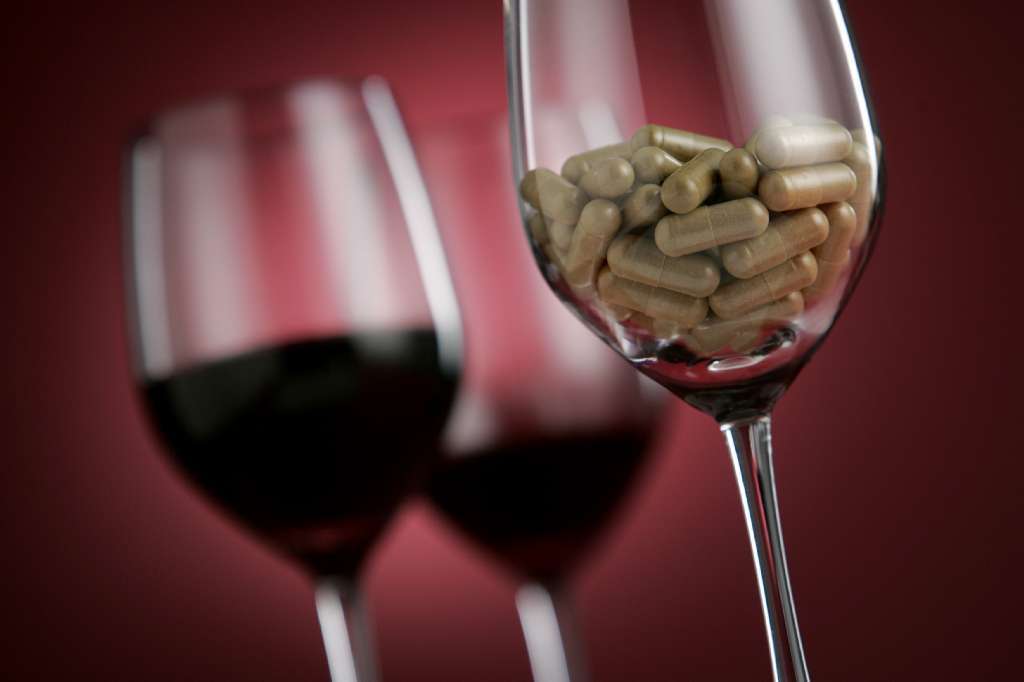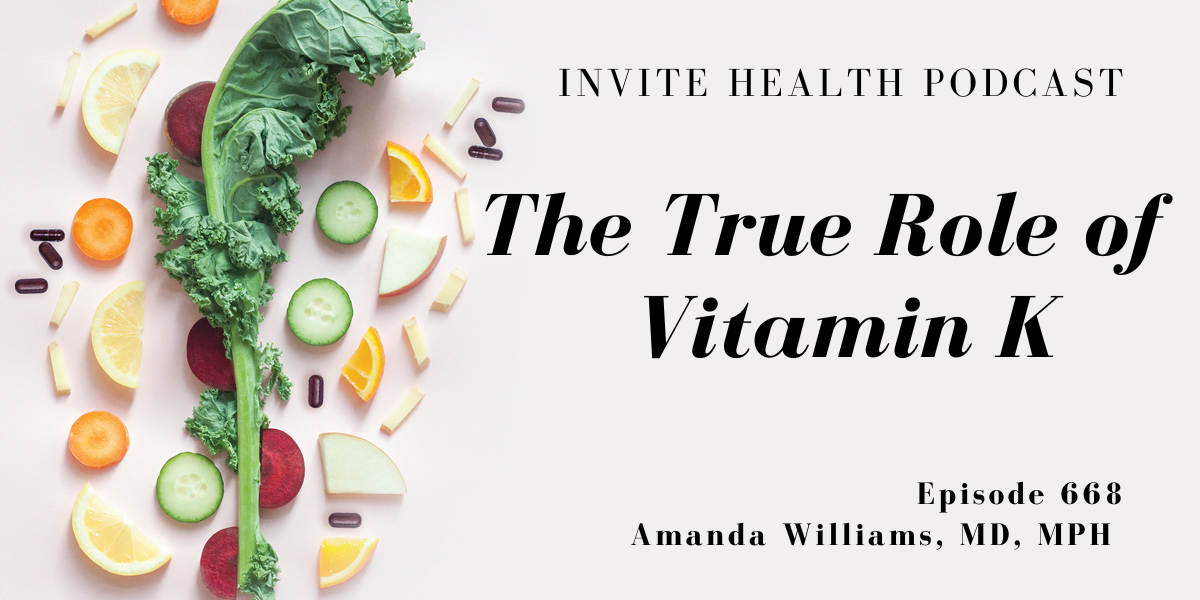Subscribe Today!
Please see below for a complete transcript of this episode.
THE TRUE ROLE OF VITAMIN K, INVITE HEALTH PODCAST, EPISODE 668
Hosted by Amanda Williams, MD, MPH.

*Intro Music*
InViteⓇ Health Podcast: [00:00:04] Welcome to the InViteⓇ Health Podcast, where our degreed health care professionals are excited to offer you the most important health and wellness information you need to make informed choices about your health. You can learn more about the products discussed in each of these episodes and all that Invite Health has to offer, at www.invitehealth.com/podcast. First-time customers can use promo code podcast at checkout for an additional 15% off your first purchase. Let’s get started.† [00:00:34]
*Intro Music*
Amanda Williams MD, MPH: [00:00:40] There are many misconceptions when it comes to vitamins and minerals, but one really sticks out when it comes to misinformation and just not understanding what this vitamin is doing for the human body, and that’s vitamin K. I am Dr. Amanda Williams, scientific director at Invite Health, and this is a topic that I have discussed in length with so many individuals on a 1 to 1 basis, because there is a lot of fear about supplementation with vitamin K. Is it safe? Should I be taking it? What if I’m on a blood thinner? Is this going to be a problem? And there is a lot that we understand about the mechanism of action, about vitamin K but there are so much more that we are actually learning. Understanding how Vitamin K is playing a role even in respiratory health. Most people, if they think about vitamin K, they think about blood clotting or they think about bone health. And we have to understand that vitamin K is not causing blood clots, that’s the first misconception. It’s part of what is known as the blood coagulation cascade. So it plays a role as a cofactor. The body requires Vitamin K, Vitamin K1 in particular when it comes to the way that the body can clot up if we have an injury. So say, for example you have a cut and you start to bleed, Vitamin K is then looked at as being a factor in allowing the body to be able to stop itself from having excessive bleeding, but it’s not creating blood clots and this is where that common misconception comes into play. And there is much out there still in the traditional medical world that if someone is on a blood thinner than they have to at all costs avoid vitamin K and even avoid green leafy vegetables where you may get too much vitamin K. Now, interestingly enough, all the way back in 2005, University of Texas, School of Pharmacy did a really fascinating study, where they gave individuals who were taking warfarin, so taking a very powerful blood thinner. So, warfarin, very powerful blood thinner, and they gave these individuals low dose vitamin K and through supplementation of giving them the low dose vitamin K, they found that this actually helped them have more regular INR readings, which is the international normalized ratio. And INR is the way that they can test to see how much warfarin they should be giving someone. Is the blood getting too thin? Is the blood getting too thick? And they found that when folks who were taking warfarin started to supplement with low dose vitamin K, that they actually had longer periods where their INR stayed in a healthy range, so they didn’t have to keep auto adjusting the warfarin dose, so this in and of itself was a wonderful finding. However, most doctors still didn’t catch on to this like, well, hey, if someone eats a salad, is that going to screw up their warfarin? No. If anything, what this study indicated was that this was going to help to improve a better time slot to which their INR would remain in a normal range. So you fast forward and we go down the road another ten years and another study came out looking at the genetic influence that even plays into this when it comes to vitamin K. So, we always have to understand that our genes are regulating every single process in the body, including vitamin utilization. So in this particular study, they were looking once again at INR control, so looking at the rate in which the blood remains at the right viscosity, so not too thin, not too thick, and recognizing that individuals who had better uptake of vitamin K or their gut-based vitamin K production coming from the microbiome was much more efficient they had significantly better normalization of their INR. So say if they had to be on warfarin, they had to be on this blood thinner. They found that vitamin K levels influenced this significantly. So, having better vitamin K levels, not avoiding vitamin K, but actually taking vitamin K in to their diet or via supplementation helped with that gene regulation of how vitamin K was actually working. So, this is one misconception, is vitamin K, this danger vitamin. And the answer to that clearly is no.† [00:04:55]
[00:04:56] So, let’s talk all about vitamin K and what vitamin K is actually doing in the body. There are multiple utilizations of vitamin K. We know that just from The Journal of the American Heart Association. They know that vitamin K reduces arterial calcification. So, we don’t want to have calcium building up within our artery walls, it’s not a good thing. In addition to this, we also know the basics of vitamin K as far as strengthening bone, which can lower the risk of osteopenia, osteoporosis, and of course, fractures. We can look at how vitamin K plays a significant influence on blood glucose regulation. So even from lowering the risk of diabetes, we can see the influence of Vitamin K’s actions in the brain and cognitive function. We know that it is playing a driving force in inflammatory regulation. So, having low levels of inflammation in the body can be linked to having healthy vitamin K levels. So, vitamin K is a fat-soluble vitamin. We know this, we know that there are other fat soluble vitamins, including A, D and E, and we know that vitamin K comes in two different forms. You have vitamin K1, which is found predominantly in green leafy vegetables, and then we have vitamin K2, which we generally find more in things like hard cheeses, eggs, for example. In any case, we know that our daily exposure just from diet alone on vitamin K is not generally up to par, as with most other vitamins and minerals. Just our dietary intake of those are not going to be high enough for that particular vitamin or said mineral to be able to perform all of the actions that the body is requiring. Same thing when we look at vitamin K, so vitamin K2, this is the one that’s been probably researched more extensively in terms of its cardiovascular benefits in the more recent years. So, you have vitamin K2 and it has two different forms, you have MK 4 and MK7. MK7 is the one that they usually zero in on on most clinical trials. MK7 is, you know, found once again in those different cheeses, different fermented foods. Natto, for example, so we can draw that correlation between those cardiovascular benefits in a traditional Japanese diet because of that high consumption of natto in their diet. And then hence why is that? Because of that MK7, Vitamin K2 form. So, looking at vitamin K’s use and we say, okay well maybe we’re going to use the invite K1/K2 complex, because we know it’s beneficial for our bones and we know it’s beneficial for helping to assist calcium find its way to the bones. I always say vitamin K2 can kind of be looked at as that helper. It finds calcium, or it may just be lingering around and says, hey, do you need a lift? I’ll help you find your way to the bones. So when we think about bone mineralization, Vitamin K2 is definitely integral to this. And so if we can get that calcium out of the vascular system and into the bone, hence we’re getting that double benefit, and this is why supplementation with vitamin K1 and K2 is definitely warranted, especially in situations if we have underlying concerns with cardiovascular health or metabolic concerns such as diabetes. For example, we know that diabetics have a tendency to have low levels of vitamin K1 and 2 in their system, which can lead to, once again significant problems. We always want to be able to identify where these vitamins are working. The actions that they’re taking, how supplementation with vitamin K1 and K2 has been shown to even improve overall cognitive function. So, the action is not limited somehow just to the health of our heart and the health of our blood vessels or to the health of our bones. We can see how we get this whole body health benefit from this one vitamin. Now, there are two forms of that vitamin, but in any case, supplementation with vitamin K1/K2 complex definitely is going to lead you down that right path for that overall systemic benefit. And these are the things that we always want to be able to zero in on. † [00:09:31]
ICYMI: B-COMPLEX VITAMINS ARE NEEDED FOR A HEALTHY BRAIN, INVITE HEALTH PODCAST, EPISODE 667>>LISTEN NOW
[00:09:32] I talked recently about the the benefit of vitamin K when it comes to respiratory health. The recent study that just came out indicating how Vitamin K can definitely play this protective role in individuals who have respiratory disorders and seeing an improvement in overall pulmonary. function in individuals who have chronic bronchitis, COPD, Emphysema. So their findings indicate that supplementation with Vitamin K would be advantageous because in those individuals who have low serum levels, your blood level of vitamin K is too low. This has been linked directly to poor lung function, so hence supplementation for someone who has respiratory concerns with vitamin K would be incredibly wise choice. And I always enjoy talking about, you know, just simple vitamins and simple minerals. Because sometimes we so much overlook the true importance of why we come into this world equipped with these different nutrients on board and understanding that if we have low serum levels of vitamin K, this is been directly associated with an increased risk of all cause mortality. What’s that mean? It means death due to any cause and when they start to extrapolate out all the factors leading to that death that they can find that those low vitamin K levels are a contributing factor. So, when you look at all cause mortality, that’s basically by definition what we’re looking at. So, we have a death because of cancer, let’s just say, and they start to look at all of the factors. They look at diet, they look at sedentary lifestyle, they look at serum vitamin levels, serum mineral levels and you can see that correlation between low blood levels of vitamin K and an increased risk. We certainly see this with low levels of vitamin K2 in particular when it comes to coronary heart disease and in the British Medical Journal, they were looking at the vitamin K levels of close to 3000 people between the ages of 46 and 49 years old, and then they followed them for over a decade and then they started to assess their risk levels for coronary heart disease and they could once again draw back this increased risk for heart disease in individuals who had that low vitamin K level. So, whether we’re looking at metabolic conditions such as type two diabetes, pre-diabetes, that link between low vitamin K intake and the development or the exacerbation of that disease state, we definitely know that vitamin K is a protective driver for all things in the body. So, we really do get these whole body benefits when it comes to vitamin K supplementation. Unfortunately, as I mentioned, there are so many bits of misconception on vitamin K, you know, when it comes to vitamin deficiencies. Vitamin deficiencies aren’t as common as vitamin insufficiencies. So to be truly deficient in one said vitamin usually isn’t the case. However, we know that insufficient levels is what can drive, kind of be like this little slow burn in the body. Because if we don’t have enough vitamin K, we have some, but not enough. You can now start to see where those problems can start to arise in all systems when it comes to regulation of inflammation, when it comes to brain health, heart health, and pancreatic health. So, this is why understanding the function of vitamin K and the need for vitamin K in the system is really very essential and hence why vitamin K matters. So, that’s all that I have for you for today. Hopefully you walk away with this one with a little bit better understanding of the importance of vitamin K and definitely speak with one of our nutritionists when it comes to how you can incorporate vitamin K1/K2 complex into your daily supplementation routine. I want to thank you so much for tuning in to the InViteⓇ Health Podcast. Remember, you can find all of our episodes for free wherever you listen to podcasts or by visiting Invitehealth.com/podcast. Now do make sure that you subscribe and you leave us a review. You can follow us on Facebook, Twitter, and Instagram, and we will see you next time for another episode of the
InViteⓇ Health Podcast† [00:09:32]
*Exit Music*











